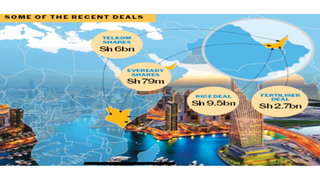
Business
Premium
Unmasking the Dubai firms that have bagged mega deals in Kenya
On October 6, Deputy President Rigathi Gachagua revealed that Kenya was in talks with countries in the Middle East and other parts of the world to buy locally-grown coffee.
Mr Gachagua said the move would replace the current process in which firms bid for specific quantities of the produce at the Coffee Exchange.
On the same day, Treasury Cabinet Secretary Njuguna Ndung’u released a statement about a bid by Pioneer General Insurance – a company owned by three Dubai-registered entities – to buy Sidian Bank’s shares valued at Sh1.9 billion.
Two of the firms – Abcon International LLC and Medillon Trading FZE – have tried investing in Kenya before. They had links to the Russian-developed Covid-19 Sputnik vaccine imported in 2021.
The shares acquired in the bank belonged to Centum Investments Company PLC, where the government has a minority stake.
Two days earlier, Prof Ndung’u had said that Dubai-registered Infrastructure Corporation of Africa (ICA) had successfully bid for a 60 per cent shareholding in Telkom Kenya.
While he did not reveal the money involved, the government paid Sh6 billion to Helios Investment Partners for the same stake in October 2022.
Also Read: Revealed - Cooking oil and rice tycoons
The two announcements are the latest in a long list of deals indicating Kenya has become the darling of the United Arab Emirates (UAE), as several companies line up for multibillion-shilling contracts barely a year after Kenya Kwanza alliance assumed power.
A week after Dr William Ruto became President, he hosted three officials from the UAE, led by Foreign Affairs Minister, Sheikh Shakhboot Al Nahyan.
In the October 22, 2022 meeting, President Ruto and Mr Nahyan resolved to increase trade ties between the two countries.
In just 11 months, at least seven firms registered in Dubai – the UAE capital and one of the world’s fastest-growing tax havens – have made moves on deals valued at more than Sh50 billion, ranging from company acquisitions to government supply contracts.
An global lobby has cautioned that the government needs to conduct due diligence to confirm exactly who is bringing money into Kenya, and what the sources of the funds are.
The NGO, which asked not to be named, added that the efforts to strengthen anti-money laundering laws could aid Kenya welcome investors without the risk of helping the flow of illicit funds.
“The country recently amended the Proceeds of Crime and Anti-Money Laundering Act and is in the process of gazetting attendant regulations to strengthen provisions that would require financial institutions and other relevant actors to ensure that they ascertain the ultimate beneficial owners of legal persons and arrangements before entering into a business relationship,” the lobby said.
“Proper implementation and enforcement of these laws alongside the wider legal framework on financial integrity and corporate governance should give Kenya a fighting chance.”
In the Sidian shares sale, Pioneer General Insurance will control 20 per cent of the bank.
Pioneer General Insurance, Business Registration Service (BRS) records show, is owned by three Dubai-based firms.
Abcon International LLC, Parkview Investments and Medillon Trading FZE own 240,000 shares in Pioneer General Insurance Ltd. This amounts to 40 per cent of Pioneer General Insurance.
Pioneer General Insurance owns 20 per cent of Sidian Bank.

Treasury Cabinet Secretary Njuguna Ndung’u has signed new rules granting the Kenya Revenue Authority unrestricted access to information on secret bank accounts held by Kenyans in 106 foreign countries.
Pioneer Insurance Holdings Ltd owns the other 360,000 shares. Pioneer Holdings Ltd is in turn co-owned by Kenyan investors. Mr David Engongo Omukubwa owns 248 shares directly, and another 250 shares through Cadence Ltd.
Mtalaki Mwashimba (40 shares), Hamstead Investments Ltd (32 shares) Hosanna Nominees (1 share) and Lex Nominees (1 share) are the other investors behind Pioneer Insurance Holdings, which controls a majority stake in Pioneer General Insurance.
Sidian Bank has a book value of approximately Sh4.27 billion. This means Pioneer General Insurance’s 20 per cent stake is equivalent to Sh854 million.
The three Dubai firms own 40 per cent of Pioneer General Insurance, translating to Sh341.6 million.
The investment should reap millions of shillings in dividends every year if the bank remains profitable.
Abcon International and Medillon Trading are no strangers to controversy in Kenya as they have links to the 2021 Sputnik Vaccine scandal.
Medillon Trading co-owns Dinlas Pharma, the company that imported 75,000 doses of the vacine, even before the World Health Organisation approved its use.
Sputnik was at the time available at hospitals operated by Bliss Pharma.
Bliss Pharma’s founder, Jayesh Saini, partnered with Abcon International in a separate misadventure to put up the tallest building in Africa – the Pinnacle.
The 300-metre Pinnacle was to be built Upper Hill, Nairobi. Abcon International was the majority shareholder in Greenfield Developers, a special purpose vehicle bringing together investors in the Pinnacle project.
Mr Saini was one of the minority local shareholders alongside Jabavu Village Ltd, the real estate arm of Hass Petroleum.
When Abcon International was looking for land for the tallest building in Africa, it partnered with Mr Saini’s Bliss Pharma in bidding for 3.9 acres the Kenya Railway Staff Retirement Benefits Authority was offloading.
Despite bidding Sh30 million less than Homebound Realtors, Abcon and Bliss carried the day.
The Pinnacle project, however, collapsed when key financiers pulled out amid a vicious land ownership battle with Ugandan James Mugoya.
Abcon International, Medillon Trading and Parkview Investments have now partnered to purchase a stake in Sidian by acquiring shares in Pioneer General Insurance.
The Nation did not find any digital footprint left by Parkview Investments Ltd.
While we could not trace the beneficial owners of the three companies, records at the BRS indicate that they share a postal address in Dubai.
Mr Isaac Okero, a seasoned advocate and former President of the Law Society of Kenya, says regulatory authorities approving foreign investments must demonstrate that they have put in safeguards to ensure that companies coming are above board and bringing cash from legitimate sources.
He adds that foreign firms should be compelled to follow local laws on beneficial ownership before the approval of their planned investments.
“Kenya will always welcome investors. It is imperative that politics be separated from the authorities that approve these investments. They (regulatory authorities) must show that they have formulated policies to safeguard our interests. If they have not, we should question the people in charge,” he said.
In the Telkom Kenya takeover, Infrastructure Corporation of Africa (ICA) LLC – Prof Ndung’u said – had emerged the best bidder. He added that it would purchase Telkom Kenya shares valued at Sh6 billion from Helios Investment Partners.
President Uhuru Kenyatta’s administration bought the Helios shares barely a week before Dr Ruto took office.
The purchase was done without Parliamentary approval, but on the backdrop of a Cabinet meeting which resolved that Telkom Kenya was critical to national security.
A year after the announcement, President Ruto’s Cabinet met and resolved to revoke the sale, with Helios expected to refund Sh6 billion to the government.
Following the veto, Treasury said ICA would purchase 60 per cent of Telkom, but did not confirm if the price would remain at Sh6 billion.
There are scanty publicly available details on ICA, save for a website. The company is registered in the Dubai Silicone Oasis, a free zone establishment. In Dubai, a free zone is an area with specific regulations that do not apply to businesses outside. They also include special tax and foreign ownership laws
None of the managers listed on the website, including CEO Anil Raj, has been mentioned on any platform in relation to the firm, except on ICA’s own website.
Mr Raj, an Indian, is the founder of OMC Power, a sustainable energy solutions firm. OMC Power has in the past worked with M-Kopa, an asset-financing platform.
Other officials listed on the ICA website are Hakan Wallin (Swedish), Sushil Jiwarajka (Indian), Karl Henrik Sundstrom (Swedish), Siddarth Mehta (Indian), Manuel Garcia (Spaniard), Tommy Forsell (Swedish), Arun Bansal (Indian) and Vimal Wakhlu (Indian).
Despite being named after Africa, its website indicates that ICA only has offices in Dubai, Stockholm and Mumbai.
Mr Raj’s LinkedIn profile indicates that he started working at ICA 10 months ago. Interestingly, the National Treasury said it started searching for a buyer in January, indicating that ICA could have been incorporated specifically for the Telkom Kenya deal.
ICA claims to own a mobile app named Orchestra, which can function as a digital identity card.
Last month, Prof Ndung’u announced that Kenya had paid Sh35 billion to three foreign firms for supply of petroleum since March, 2023.
Kenya entered into a government-to-government deal with the three companies in a bid to stop the haemorrhage of dollars through the usual procurement that has seen importation of petroleum products done by private sector players.
The private sector players, Prof Ndung’u said, create a dollar shortage as the products are paid for in foreign currency. To save the shilling from further slide, the government suspended the usual oil import process and struck deals with other State-owned firms.
Two of the companies – Abu Dhabi National Oil Corporation General Trading and Emirates National Oil Corporation – are owned by the UAE government.
The third, Aramco Trading Fujairah FZE is owned by the Saudi government.
By the end of the next payment date, Kenya would have parted with at least Sh70 billion in the government-to-government deal.
In yet another instance, Dubai’s InvestAfrica bought a 35 per cent stake in Eveready EA. The once time giant battery maker has struggled for years following technological changes that affected its business, alongside competition from imports.
The shares were purchased from East Africa Batteries Ltd, a company owned by the family of Naushad Merali, one of the country’s most famed corporate dealmakers. Merali died in July, 2021. His family agreed to the Eveready shares sale.
InvestAfrica’s 35 per cent stake was valued at Sh79.1 million at the time of purchase in April. InvestAfrica took up the Eveready shares.
The firm had in January bagged a Sh1.4 billion tender to supply Kenya National Trading Corporation (KNTC) with edible oils and rice, as other companies registered in Dubai also secured lucrative deals at the expense of locals.
A spokesperson for an international lobby told the Sunday Nation that the Public Procurement Regulatory Authority (PPRA) should review the contract awards and publish them on its website.
She urged the State to help locally-registered firms grow to a position of being able to compete for government deals.
“PPRA should review the matter to ascertain to what extent the law has been breached. In any case, the process and results of such procurement should be published in the public procurement information portal,” the spokesperson said.
“Separately, where it is determined that local firms lack capacity (technical or financial) to compete in these tenders, there should be a concerted effort by government to ensure that this capacity is enhanced if the bottom-up economic transformation agenda as preached is to be realised.”
InvestAfrica was among several firms the National Assembly investigated alongside KNTC when it emerged that some contracts were not awarded competitively.
In response to MPs, then-Trade CS Moses Kuria argued that when seeking commodities for ordinary trading, KNTC is not compelled to follow the usual procurement procedures.
InvestAfrica offered to sell the rice and edible oil to KNTC through its local subsidiary, Shehena Commodity Ltd.





